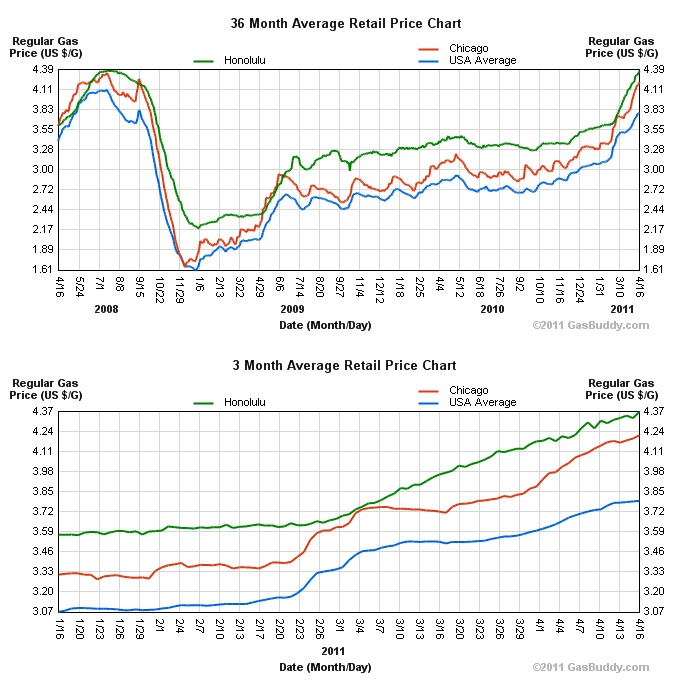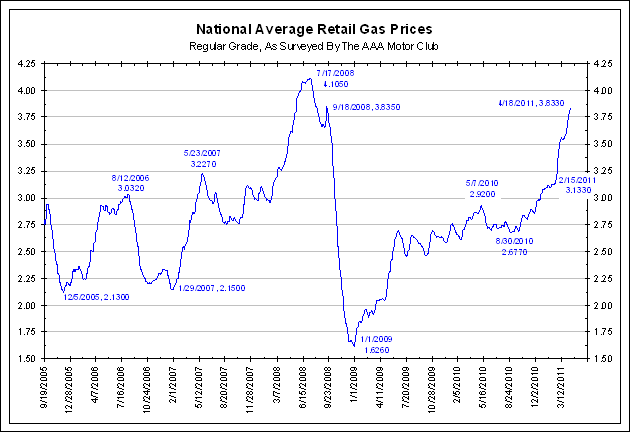- Los Angeles Times – Oil falls, but gasoline prices are still rising
Oil prices took a tumble, but the relentless rise in retail gasoline prices continued overnight. The national average for a gallon of regular gasoline reached $3.833 Monday, according to the AAA Fuel Gauge Report, which is compiled by the Oil Price Information Service and Wright Express. That was 6.3 cents a gallon higher than the price one week ago, 29.1 cents a gallon higher than a month ago and 96.8 cents a gallon higher than a year ago.Six states reported gasoline prices averaging more than $4 a gallon: Hawaii ($4.484), California ($4.203), Alaska, $4.179), Illinois ($4.073), Connecticut ($4.068) and New York ($4.018.) In California, the price rose slightly from $4.202 a gallon overnight, but Monday’s average still represents a jump of 23.5 cents a gallon since last month and of $1.093 a gallon since last year. A similar rise in prices is expected to be shown when the Energy Department releases its weekly survey of retail fuel costs later today. “A lot of people are saying that it feels like we’re back in 2008,” said Phill Flynn, an analyst for PFGBest Research in Chicago, referring to the all-time record high prices for crude oil, retail gasoline and diesel reached in the summer of 2008. “But this is different. Now, we see oil doesn’t have to be near the high mark of $147 or $148 a barrel for gasoline to be closing in on a new record, and we’re going to come close to a new record.” - 18.4 cents per gallon in federal taxes
- 20.1 cents per gallon in Illinois state taxes
- 1.1 cent per gallon in state environmental and underground storage tank taxes
- 6 cents per gallon in Cook County taxes
- 5 cents per gallon in city of Chicago taxes
- The above totals 50.6 cents per gallon.
- The Chicago Tribune – (March 5, 2009) Suburbs pumping up gas taxes
Revenue-raising measures come as fuel prices are expected to rise
With the cost of gasoline expected to surpass $3 a gallon this summer, more motorists will be looking to save a few cents at the pump, but that’s getting more difficult with an onslaught of new municipal gas taxes.Cash-strapped municipalities — from Oak Lawn to Des Plaines to Glenview — have turned to taxing fuel to make up for plummeting revenue. Elmhurst is considering a 1.5-cent-per-gallon tax and Naperville is weighing whether to add 2 or 3 cents to its 2-cent-per-gallon tax. To make the tax more palatable, some communities are designating the money for road and infrastructure improvements. And while officials defend the need for revenue, gas station owners say the tax puts them and maybe the towns at a competitive disadvantage. In Des Plaines, owners with convenience stores want the right to sell packaged liquor to make up for what they say they’re losing. - WGNTV – (March 16, 2010) – Naperville doubles gas tax to plug budget hole
Naperville was staring at a $14.1 million deficit when it began its budget process for the upcoming fiscal year. After taking several steps to shave that figure, officials still were left in a $4.5 million hole. Monday night, the City Council closed that gap, in large part by raising the city’s gasoline tax to 4 cents a gallon from 2 cents and by imposing a $2 monthly fee for garbage collection. - Alsip: 3 cents per gallon
- Dolton: 1 cent per gallon
- Evergreen Park: 6 cents per gallon
- Oak Forest: 3 cents per gallon.
Comment
The sharp-eyed reader may note that national gas prices peaked at $4.12 in July 2008, 34 cents (7.8%) below the current price of $3.80. However, Chicago’s gas prices, at $4.227, are just 14 cents (2.8%) below their July 2008 high of $4.35. So why are Chicago’s gas prices only 2.8% below their all-time peak whereas national prices are 7.8% below their peak?
Detailing Chicago Taxes
The answer, which is always the answer in Chicago, revolves around taxes. In Chicago, gasoline taxes include:
To make matters even worse, Illinois is one of only 7 states that charges sales tax on gasoline prices. The table below details this:
<Click on chart for larger image>
50.6 cents/gallon of the current $4.227/gallon in Chicago comes from fixed taxes per gallon. Variable sales taxes in Chicago account for another 36.3 cents/gallon (9.75% of the pump price less the fixed taxes). Combined, a whopping 86.9 cents/gallon, or 20.6%, of the current pump price in Chicago comes from taxes.
According to the American Petroleum Institute (API), the 50.6 cents/gallon of fixed costs are above average. Then add in the crushing 9.75% sales tax, which equals Los Angeles for the highest sales tax for a large city, and Chicago drivers pay more per gallon than anyone outside of California or Hawaii.
State And Suburbs Raise Gas Taxes
The above explains why Chicagoans pay more per gallon than the rest of the country. However, it does not explain why Chicago gasoline prices are only 2.8% away from their July 2008 peak while national prices are still 7.8% below their peak. In fact, as the next table shows, Chicago’s sales taxes were higher in 2008 than they are now (Cook County recently reduced its sales tax, bringing composite rates from 10.25% to 9.75%).
<click on table for larger image>
In this case Chicago is not at fault. It is the fault of the state and the suburbs, which is included in Chicago’s gas prices (it is actually a Chicagoland gas price).
When gas prices collapsed in 2009 (see chart), the state of Illinois and many of Chicago’s suburbs took advantage of these lower prices to rush in extra gasoline taxes.
<Click on chart for larger image>
Other examples of gas taxes in Chicago’s suburbs:
On April 15, the national average wholesale price of gasoline was $3.29/gallon. Add the 86.9 cents/gallon in taxes plus 3 to 5 cents for state and suburban gas tax hikes since 2008 and that works out to about $4.227/gallon.
H.L. Mencken explained government and taxes best:
Democracy is the theory that the common people know what they want, and deserve to get it good and hard.
— A Little Book in C major (1916)




As Chicagoans are painfully aware, residents of the area currently pay the highest gas prices outside of California and Hawaii. To illustrate, as of Friday, April 16, the 5 metropolitan areas with the highest average gas prices (unleaded, self-serve) are:
For comparison, here are the 5 metropolitan areas with the lowest average gas prices on April 16:
Why Chicago’s gas prices are so high is a story for everyone. While Chicago is not the only place charging high taxes on gasoline, it is doing so to a much larger degree than most other places.
Approaching The 2008 Highs
Gas prices in Honolulu, Chicago and the national average are shown in the two charts below. They are the same chart, different time frames.